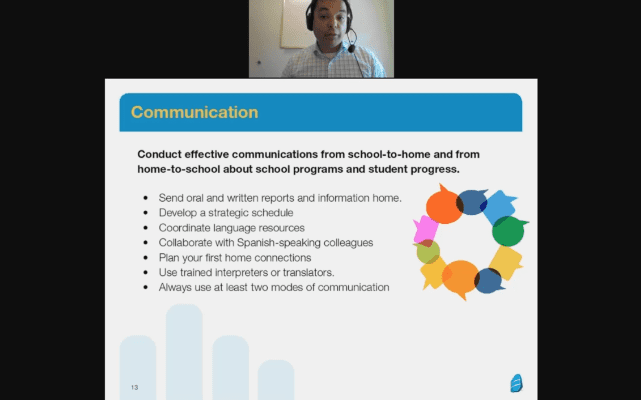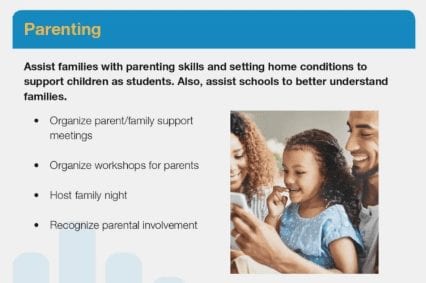Connecting with ELL Parents One Step at a Time
There’s no secret formula for parent engagement. And when English isn’t their first language, the obstacles seem more daunting. According to Rick Castaneda, a training specialist at Rosetta Stone, the key is to develop a multi-step approach that gives parents several different opportunities to connect with the school and their children’s teachers while also making sure that the parent, no matter their language, feels like a key part of the decision-making process. In his edWebinar, “Involve Parents for Greater English Learner Success,” Castaneda discussed six key areas of parental involvement, based on the work of Johns Hopkins professor Joyce L. Epstein, PhD, and how each one helps build a stronger relationship.
- Parenting: Don’t call them parenting classes—this is not about trying to teach families to be better parents. Instead, these strategies are about finding opportunities to get parents involved with the school by reaching out to them rather than waiting for them to come to the school. Examples include parent workshops, regular parent support meetings, and mentoring programs with other English Language Learner (ELL) families. Most of the time, the goal is to get the parents into the school building and make them feel welcome in the school community.
- Communication: Sure, schools send messages home, but is it done in way that invites communication back? More important, for the ELL families, what type of communication works best? When Castaneda was in the public school system, he sent home written reports, had robo-messages for all families, and personally called families that he knew would want real-time conversations. In addition, he cultivated a stable of trusted translators who could interpret the school’s communication, whether written or in person. The key with translators is to make sure that teachers and administrators are looking at and speaking directly to the family members and not the interpreter. In turn, the interpreter should not editorialize but repeat everyone’s words verbatim. (Castaneda also recommended that students not act as the translator, especially for sensitive discussions.)
- Volunteering: Most schools have volunteer programs, but is there something for every family at the school? Castaneda also advocated for sending out parent surveys and finding out their strengths and interests. For instance, a parent might have an expertise in a sport or a particular art form and be able to lead an after-school club. Or, if family members aren’t available during the school day, they might be willing to come help with weekend activities. The best time to highlight volunteer opportunities is at already-scheduled school events so that parents don’t need to come back to school for another meeting.
- Learning at home: This can be difficult, but it’s also the most important category. Family members don’t need high levels of English language proficiency to help with the school work, but they might need some direction. Communicate to parents what topics the students are studying on a regular basis, and give them strategic questions they can ask in any language: Tell me one thing you learned today, tell me one thing you liked about school today, etc. In addition, teachers should create assignments that involve the family and give the parents ideas for learning at home.
- Decision Making: All parents want to feel like they have an essential voice in their child’s education. Whether it’s working one-on-one with a teacher or leading a parent group, they will be more involved if they feel like the teachers and administrators are listening to them. One idea, if applicable, is to let the ELL parents form their own parent group; depending on the size and demographics of the school, there may be more than one. Give their ideas and activities the same weight as the other parent organizations.
- Collaborating with the Community: Identify community, faith, and other organizations that are already working with ELL families and find ways you can work together. Perhaps the school can make presentations at local houses of worship, for instance, or they can invite local leaders into the school for family workshops. Show the families that the school wants to be a part of their larger community.
Because of the large scope of a parental engagement program, administrative support is essential. However, it’s also another program that could potentially tax school resources. Castaneda suggested developing a step-by-step plan first and presenting it to key administrators, emphasizing proven programs along the way. “Research-based. That’s what many of our administrators want to know. Is it research-based? Make it digestible for them,” said Castaneda. “Talk about what you’re willing to do. Don’t over-commit yourself and overextend just to see this happen. If you can’t get that buy in, I recommend identifying the specific activities and categories that you can address on your own and make happen…Start with what you can.”
This edWeb broadcast was sponsored by Rosetta Stone.
This article was modified and published by eSchool News.
About the Presenters
Rick Castaneda is a training specialist at Rosetta Stone. He works with school districts all over the country to lead trainings for successful language program implementations. Rick brings experience as a former educator, an after-school program director, an interpreter/translator, and a family engagement expert in the public school system in Virginia for 20 years.
Melanie Rogers is the training team lead for Rosetta Stone. She energetically and passionately helps teachers across the country implement language learning solutions into their classrooms.
Join the Community
Using Technology for Language Instruction is a free professional learning community on edWeb.net where educators can collaborate on how to prepare students to succeed as global citizens and to expand their horizons.






Comments are closed.